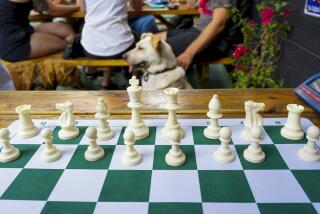Reuben Fine; International Chess Star and Psychologist
- Share via
Reuben Fine, whom many mavens of the chess world believed could have been America’s greatest gift to the game had he not been forced to support a family, has died at a New York City Hospital.
Fine, who abandoned chess as a young man to pursue a career as a psychologist and author, died Friday of pneumonia and a stroke. He was 79 and had lived in Manhattan for many years.
Like Bobby Fischer in modern times, Fine made a meteoric rise in the chess world. While a teen-ager, he consistently defeated international grandmasters and, until World War II crippled chess competition, loomed large as heir apparent to the legendary Soviet-born Alexander Alekhine, then the acknowledged as the world’s best. But chess in the 1930s was a gentleman’s game without financial reward, so by 1939 Fine was forced to redirect his life.
He enrolled at the University of Southern California in 1941 and earned a doctorate in psychology, becoming an author and analyst.
He did play chess occasionally over the years but never approached the level of competition he had enjoyed as a young man.
Born into a family headed by a poor Bronx businessman, he learned chess from his uncle. He showed a natural flair for the game and was competing successfully in chess clubs before he was 10. While in his teens, he managed to gain a draw against Alekhine at a match in Pasadena, and, encouraged by that success, entered the professional chess world after graduating from City College of New York in 1932.
Even though Fine was starting to win international matches in Europe, most of his income came from writing for magazines and chess books or annotating games for other publications.
In 1933, Fine played in a tournament in Nottingham, England, which involved Raoul Capablanca and Alekhine--who tied for first--and Fine and Samuel Reshevsky (who with Fine was dominating American chess), who tied for second. After that, Fine won or tied for first at tournaments in Amsterdam and Zandvoort in the Netherlands, in Moscow and Leningrad in the Soviet Union and at Margate, England.
Of the 13 international contests he entered, Fine won eight and tied for second in nearly all the others. But a U.S. championship eluded him.
In 1938, Fine entered the AVRO tournament (named for the sponsoring Dutch radio station) set up to determine who would challenge Alekhine for the world championship. Fine and the Estonian Paul Keres shared first place, but Keres was awarded the prize and the championship challenge on a tie-breaker.
A year earlier, he had married Charlotte Margoshes, a psychologist. The war intervened the following year.
Later in his life, Fine coupled his expertise in chess and psychology to produce such books as “Bobby Fischer’s Conquest of the World Chess Championship: The Psychology and Tactics of the Title Match” in 1973.
Among Fine’s best-known chess works is “Basic Chess Endings,” a 1941 book still considered the definitive endgame advice.
Further melding his two vocations, Fine likened the king and queen in chess to the mother and father of the family and the chess board to the family environment. A Freudian devotee, Fine wrote many books on the Austrian’s theories, including “A History of Psychoanalysis,” to try to refute the argument that Freudian beliefs are not sufficiently accepted to be a basis for fact.
“Freud laid a solid foundation upon which the building is still being constructed,” Fine wrote. “The foundation, like Einstein’s relativity and Darwin’s evolution, is so solid that it probably will never change, but the building can be altered in many ways.”
He is survived by his fifth wife, Marcia, a son, daughter and stepson.
More to Read
Go beyond the scoreboard
Get the latest on L.A.'s teams in the daily Sports Report newsletter.
You may occasionally receive promotional content from the Los Angeles Times.








